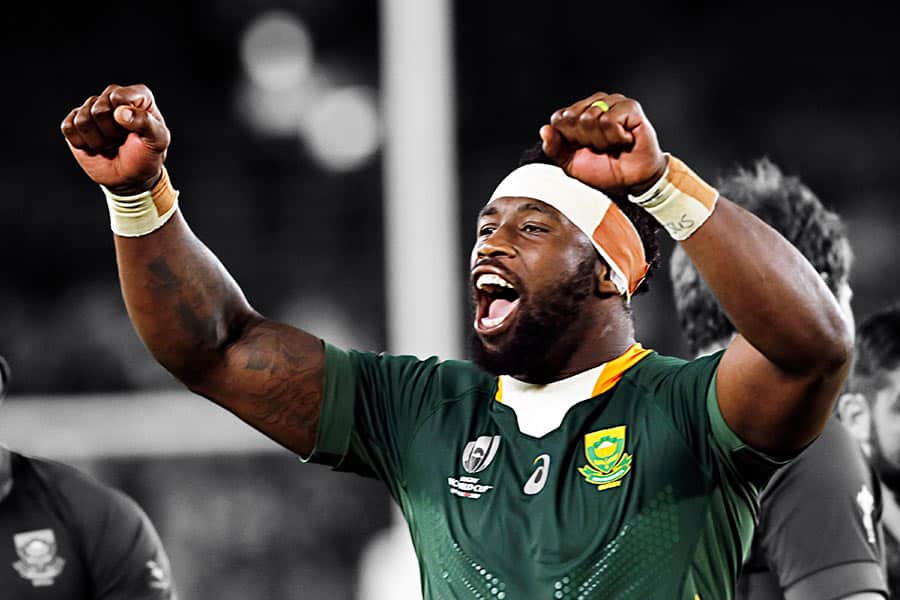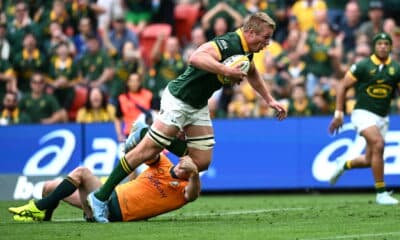
06 November 2019, by: Quintin van Jaarsveld
RWC 2019: The good, the bad and the ugly
The ground-breaking ninth edition of the Rugby World Cup was captivating from start to finish, writes Quintin van Jaarsveld.
The global showpiece made its way to Asia for the first time and proved to be a great advert for the game. The 48-match tournament was the ultimate rugby rollercoaster – there were plenty of breath-taking highs, some heart-breaking lows, and shocking twists and turns.
GET THE ADVANTAGE WITH OUR RUGBY BETTING OFFERS
Extensive pre-match and live in-play markets on every game.
Our legendary BET Boosts to give you extra value on every game!
Exclusive to BET.co.za customers.
There’s nothing like hosting the World Cup to inspire a team to achieve something truly special. The groundswell of support the Brave Blossoms received fuelled a fairy-tale run that saw them surprise all and sundry by topping Pool A after an unbeaten run which included historic upsets of Tier 1 teams Ireland (19-12) and Scotland (28-21) to qualify for the quarter-finals for the first time.
The hosts played awe-inspiring rugby and became beacons of hope when devastating Typhoon Hagibis hit in Week Four. The performance they put forth in the do-or-die pool match that Sunday, when they blew the Scots out of the water, was as inspirational and emotional as it gets, with coach Jamie Joseph and talismanic captain Michael Leitch dedicating the win to the over 70 families who lost loved ones and the countless displaced by the typhoon.
Their magical run may have come to end following their last-eight encounter against eventual winners South Africa, but they were victors in defeat, having made history and inspired those who needed it most. Overall, Japan was stellar hosts, fully embracing the tournament, teams and players and bringing an unrivalled level of respect to rugby.
South Africa as a nation and the sport of rugby as a whole need the Springboks to be a global force. Two years ago, the dynasty that is Springbok rugby seemed on its deathbed, following a 57-0 humiliation at the hands of arch-rivals New Zealand. That record low in Albany was a sign of the sorry state of South African rugby during what was its most tumultuous time.
Enter renaissance man Rassie Erasmus and fast forward to November 2, 2019, when Siya Kolisi, the Springboks’ first-ever black captain, lifted the Webb Ellis Cup after a masterful 32-12 massacre of heavy-favoured England (fresh off dumping the defending-champion All Blacks out of the tournament) in the final.
With their fantastic third title triumph, the Springboks returned to the top of the World Rugby rankings for the first time in over a decade and much like their predecessors in 1995 and 2007, helped bring together a nation in need of unity and hope.
The tournament was expected to be the most open yet and it, indeed, highlighted how teams had managed to close the gaps on the traditional powerhouses. England’s epic 19-7 win over the All Blacks in the semi-finals sent shockwaves through the sport and generally elevated excitement levels as fans eagerly anticipated the changing of the guard in the final.
As sensational as the All Blacks are, and how deserving they were to win historic back-to-back World Cups in 2011 and 2015, dominance diminishes the wider audience’s interest in any sport, be it Manchester City ruling the Premier League, the New England Patriots owning the opposition in the NFL or Lewis Hamilton dominating Formula 1.
The All Blacks’ downfall shouldn’t be celebrated, but rather the global growth of the sport, which saw five Northern Hemisphere sides – England, Wales, Ireland, France and Japan – reach the quarter-finals and new champions being crowned.
Duck-tailing on the tightly-contested nature of this year’s World Cup, fans were treated to some unforgettable underdog upsets. The Brave Blossoms’ aforementioned heroics against Ireland – who’d entered the tournament as the number one team in the world – and Scotland were the stuff of legend.
Equally, or perhaps even more memorable, was Uruguay’s historic win over Fiji. Los Teros’ greatest day, the shock 30-27 victory over the Pacific Islanders was one of the highlights of the tournament, the wild celebrations from the players and coaching staff making for a heart-warming moment that will live on forever.
Fiji, for their part, thrilled and troubled both the Wallabies and Wales. All in all, Tier 2 sides, many made up of mostly amateur players, showed plenty of heart and earned the respect of their much-vaunted opponents and the rugby fraternity at large for their guts and never-say-die attitude.
The spotlight forcibly fell on referees far too often as controversial calls consistently marred matches. Jérôme Garcès became public enemy number one in South Africa after his handling of the crunch Pool B battle between the Springboks and All Blacks. A damning video highlighting the French referee’s officiating of the contest won 23-13 by New Zealand, soon went viral and one would assume, it was difficult for the World Rugby brass to watch.
The politician-like handling of the fallout, waiting for the outrage to subside before diplomatically admitting there’d been some “questionable” calls and lack of accountability as it pertained to the perpetrator was a poor reflection on the powers that be.
Despite the overwhelming criticism and his well-documented history with South Africa, Garcès went about his business and was entrusted to officiate the Springboks’ semi-final clash with Wales as well as the final. Garcès, to be fair, was far from the only bad apple, but he became the face of the persisting refereeing issues, which included eight red cards being issued, many of which were suspect.
Jaco Peyper was seemingly the only referee reprimanded by World Rugby, and true to form, it was for the most baffling reason imaginable. The game’s governing body investigated the circumstances around Peyper posing with Wales fans and playfully mimicking the elbow for which he’d sent off France lock Sebastien Vahaamahina during Les Bleus’ quarter-final clash with Wales.
World Rugby deemed the photo “inappropriate” and the South African official was consequently not considered for a semi-final appointment. The decision raised the ire of many rugby lovers, none more so than ex-England loose forward James Haskell, who slammed World Rugby in an expletive-laden rant.
Another unpopular decision (to put it mildly) by World Rugby saw them fine England £2,000 for crossing the halfway line as they lined up in a V-formation to face the Haka before their semi-final showdown against New Zealand – yet another poorly-handled farce that made headlines.
In an unprecedented move, World Rugby cancelled two key games – the Pool C clash between England and France and the Pool B match between New Zealand and Italy – due to Typhoon Hagibis. While the decision was the right one, proper planning should’ve been done as weather worries of one kind or another had been expected to affect Asia’s first World Cup. Reserve days ought to have been included in the tournament schedule to lessen the likelihood of matches having to be called off.
An ugly by-product of insufficient planning, a desperate Scotland side threatened legal action should their critical Pool A clash against Japan be axed. Had this happened, the Scots would’ve been eliminated as the two points both teams would’ve been awarded wouldn’t have been enough for Scotland to unseat either the Brave Blossoms or Ireland. Fortunately, the match did take place and the Scots were sent packing in any event. World Rugby slammed Scotland’s “disappointing” threat and said it would probe their “comments and behaviour.”
The aforementioned incident that spawned the Peyper saga, France lock Vahaamahina lost the plot and elbowed Wales flanker Aaron Wainwright in the face in the 48th minute of the sides’ quarter-final clash. The mindless act of foul play earned Vahaamahina a red card and cost Les Bleus the game.
Springbok coach Erasmus was forced to address allegations of racism within the camp after a video surfaced appearing to show winger Makazole Mapimpi “being shunned” from a huddle featuring some of his white teammates after the 49-3 win over Italy.
Both Erasmus and Mapimpi set the record straight, revealing it was nothing more than a “standing joke” within the squad that saw the starting XV and matchday replacements – known as “The Bomb Squad” – split into different groups. Erasmus added it was “sad” that the clip had been misinterpreted. Fortunately, the united team’s title triumph helped unite their countrymen back home.
JOIN BET.CO.ZA NOW AND GET 100% DEPOSIT MATCH UP TO R1000
Open your BET.co.za account here
Deposit using your preferred method
Your bonus gets added immediately!
MORE RUGBY






















